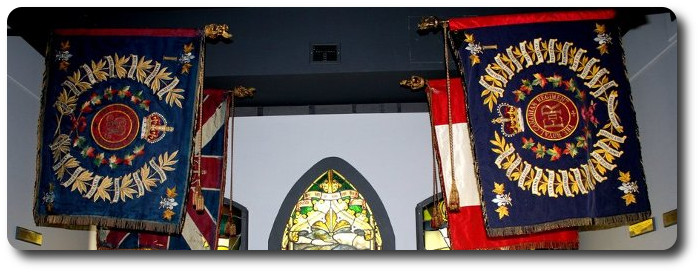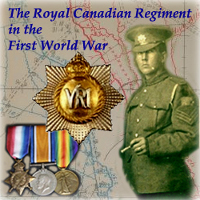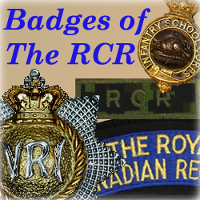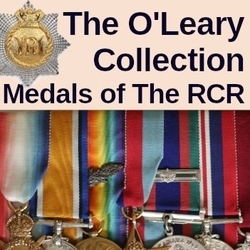
Researching The Royal Canadian Regiment
Battle Sounds
Capt James T.B. Quayle enlisted in the Infantry in May 1942. In March 1943 he was shipped overseas as a reinforcement for The Regiment. He joined The RCR in Sicily and served with The Regiment until the end of WWII in Holland. Captain Quayle's service included Platoon Commander, Scout and Sniper Platoon Commander and finally Company Commander. He was wounded on four occasions (a Regimental record). After the war he returned to university, graduated and has been practicing medicine in British Columbia since 1958. Captain Quayle has written a number of accounts of his wartime service. They are of a purely personal nature and, while his memory for incidents is "fairly good", the accounts are not an attempt at official history.
Capt Jimmy Quayle
The Connecting File 1991
The sounds of battle were varied, deadly and distinct. Learn them and your chances of survival increased dramatically. But the learning took time and time was in very short supply in action. Most died before the sounds made sense. But each sound was special and evoked a response that helped preserve your most fragile expendable life.
There was the high pitched "burrp burrp" of the German MG 42, my own special nemesis. The human meat cleaver in action. Drop in a hollow and wait and then be prepared to run as fast as you can from one hollow to another. The high rising scream of a big incoming shell. Stop whatever you are doing, analyze the sound, either go on talking, or drop in a hollow NOW! The sharp zip and immediate wham of an 88, flat firing at high velocity. , Get behind something, anything, but very, very quickly. Almost every shell that fell on us was called an 88 but few really were.
The most inaudible cat-like hiss of a plunging mortar bomb, the first warning usually a blast in our midst with men broken and bleeding. Flatten and wait! The unbelievable shattering roar of an artillery barrage, centuries old buildings pulverized and the whole landscape metamorphosing in front of your eyes. The rising scream of incoming shells. Almost always our short falls, so move closer and closer and closer. The sharp crack of a rifle bullet snapping by our head, called sniper fire but usually a solitary German rifleman firing his Mauser 98 in a desperate, inaccurate gesture. Stop standing in the open like a clueless twit.
The tinny clatter of a 9 mm. Schmeisser sub machine gun. No worries whatsoever unless the owner was standing right in front of you. And then the very special sound, the Nebelwerfer or "Moaning Minnies" as we called them. Giant 150 mm. rockets launched in sequence from a 6 barreled mount. Screamers mounted in their tails. Supreme morale shatterers as they came howling at you through the night skies, sirens screaming like giant air-borne police cars.
The Valkyries of World War II battle sounds. But they were very, very inaccurate, their droning wails telegraphed their punches and their main effect was blast. Usually lots of time for cover. These then were the sounds in the cacophony of battle. There were others too. The clank, grind, rattle, squeak, and roar of the tanks approaching at night. Fortunately, in my experience, always ours and not theirs. But they occasionally came, unexpected, and unannounced and caused some heart stopping moments in the middle of black lonely nights. And the roar of fighter planes, either diving and bombing or spitting out bullets and cannon shells. Two out of three times ours, mistakenly bombing and strafing their own. Over so quickly there was nothing to do but drop, press into the dirt and hope. A very rare sound heard at night in the fighting around Ortona. First a soft distant "Whump" to the North. Then a tearing fabric noise beginning into the North and arching slowly, slowly, slowly overhead through the starry, chilly Adriatic night. Someone ripping interminable bolts of cloth. We found later it was an enormous gun mounted on rail road tracks. It would emerge from a tunnel, fire a few huge long range shells meant for San Vito miles to our rear, and then duck quickly back before it could be located and destroyed by our artillery. We nicknamed it the "Night Train to San Vito".
Learn the sounds and learn quickly, but even this was no guarantee of survival. The most seasoned veterans were never impervious. The rending shell out of nowhere, the solitary slamming, puncturing rifle-shot out of no man's-land, the sudden roar and stunning blast of an overlooked boobytrap. These steadily removed both the greenest and the greyest. Listen and listen very carefully to the sounds of war. Listen and learn and learn very quickly. Life was so expendable that anything that gave you the slightest edge helped on the roulette table of battle survival.
The sounds of war, all lethal and all designed for one purpose: to kill you! I have often wished a musician would write a battle concerto. In my imagination the concerto comprises two solo instruments; the German Ma 42 with its rapid firing, burrp! burrp! burrp! and our Bren gun with its barn! barn! barn!. The first movement is entitled "The Attack". At the beginning, officers leave their various company positions and head back over the shell swept ground to Battalion Headquarters for a briefing. A quiet subdued theme plays here, full of tension and foreboding. Feet shuffle slowly over muddy fields and narrow foot paths. In the distance, barely discernible, there is a quiet duet between the Ma 42 and the Bren gun. At Battalion Headquarters orders are given for the new attack. The same subdued theme continues as officers return to company positions. Orders are passed on to non-commissioned officers and platoon commanders. Tension rises! The attack is imminent. The highrising banshee yell of our first ranging hells begins, while we all move closer and closer to the Start Line, heart rates rise. Dissonances from Stravinsky's "The Rite of Spring". Suddenly the appalling crescendo of our full artillery barrage screams on to our objective. The sky is one continuous wail of shells, the ground ahead an unending, shattering whirlwind of explosives and destruction. Move closer, closer and closer, while the whole world blows up around you. Faintly in the background the screaming and moaning of wounded men. Sudden and confusing explosions in our midst, the German defensive fire. Our artillery barrage lifts, there is an eerie silence, then once again the two instruments dueling as we charge positions. Tension subsides slowly, as we dig in, collect our wounded, and march the prisoners back.
The second movement is entitled 'The Patrol". We have secured the objectives and our coffin sized holes in the ground have been dug. We must patrol to the next ridge to find out if it is occupied. One officer and five men creep out over a black landscape. The theme here is soft and eerie. A sudden alarm as we stumble upon a dead man in a shell hole, mouth agape, eyes wide open. Hearts hammer louder and louder. A searing note as a parachute flare floods the landscape with a blinding white light. More creeping forward and then the sudden sharp rip of an MG 42 and the crack of grenades. One of our men has caught the full burst in his leg but he does not utter a sound.
The ridge is definitely occupied. We return slowly to our positions, carrying our stoic member with us. Tension decreases. There is a sudden, loud challenge from our front lines. We give the correct reply and move on in comparative safety. The final movement is entitled "Rest Area". We have been pulled back for rest and re-training. The theme here of the final movement is light and full of revelry. In .the background the strains of "Lili Marlene", a favourite from desert days on both sides, plays softly in the background.
"Underneath the lamp light
By the barrack gate".
No tension whatsoever. A Bacchanalian mood, sounds with an Italian theme suggesting warmth, women, merriment and good red wine. The rest area draws closer and closer to its end. The atmosphere changes to a quiet, subdued strain. An Orders Group is called. Softly remotely, far, far away there is a sharp, ripping sound with an eerie echo, and in riposte a reverberating "thump, thump, thump". The concerto for two is resuming. Pressure builds slowly as we march towards fresh objectives and more deaths; The sounds of the two solo instruments of the concerto become louder and louder, the Bren gun and the MG 42, the woodpecker and the rattle snake, the jack hammer and the chain saw. The concerto ends.
Three years after the war I was driving a sight-seeing bus in Westmount in Montreal. Summer was the time for students to make money at a job, any job. It was a typical hot, humid Montreal summer afternoon. I was more than a little torpid. Suddenly and without warning came a familiar sound! The ascending scream of a large shell heading straight at me. The sound had come suddenly and impossibly out of nowhere. Survival reflexes took over. GET DOWN! GET DOWN! I flattened desperately but I only managed to impale myself on the steering wheel like some oversized insect specimen. My passengers stared in confusion. Then I saw the culprit. A large compressor supplying air to jack hammers had started up beside the road. The first turn of the compressor produced a very special screech, the high rising scream of a 150 mm. shell and it was heading straight at me. I straightened sheepishly and tried to pretend that somehow I had slipped off my seat.
The sounds of war are fading slowly down the corridors of time. There are no more sudden dives for cover, no more freezing when a loud bang occurs; but the quick snap of rifles at a firing range still trigger tension and an atavistic prickle of hairs. Loud fireworks, at close range, provoke unreasonable irritation. The sounds of war grow softer with the years, but they still remain, increasingly muted in the mind, as long as memory lasts.
"Blowout, you bugles, over the rich dead!
There's none or these so lonely, and poor or old,
But, dying, has made us rarer gins than gold".


